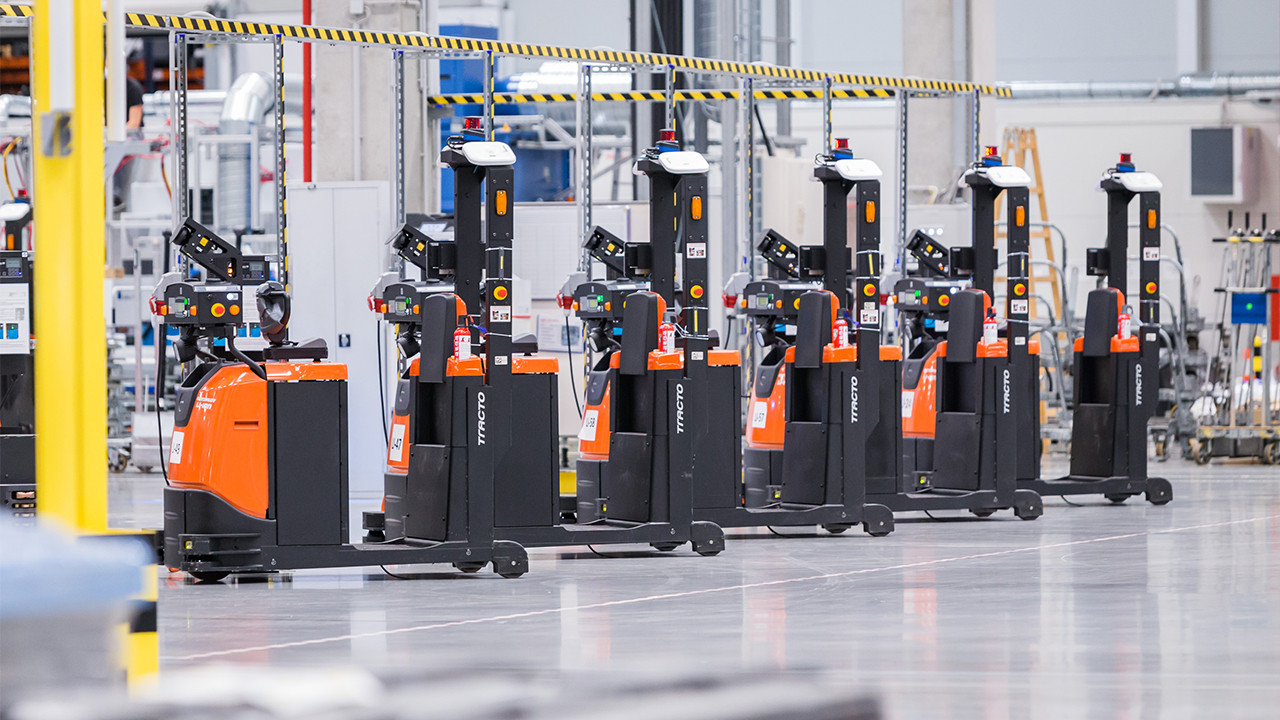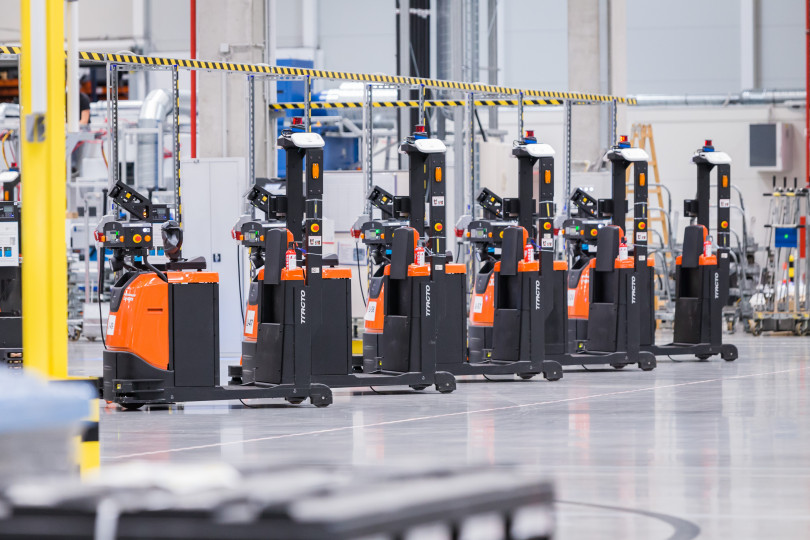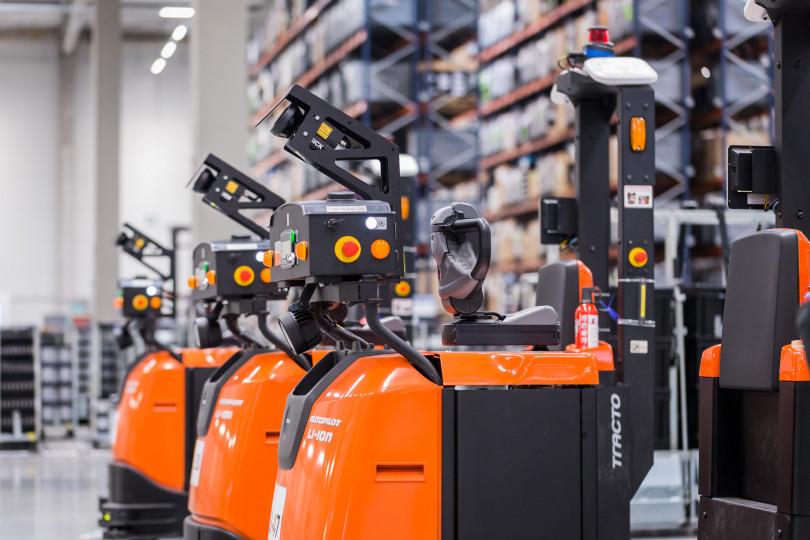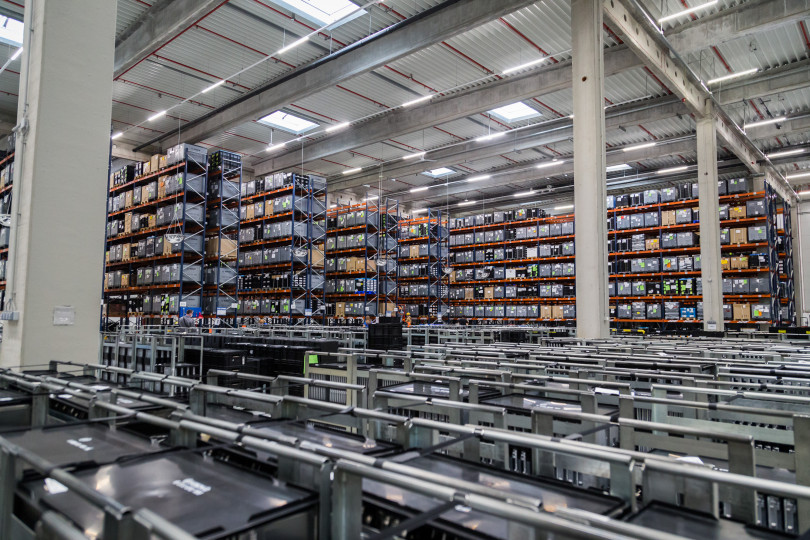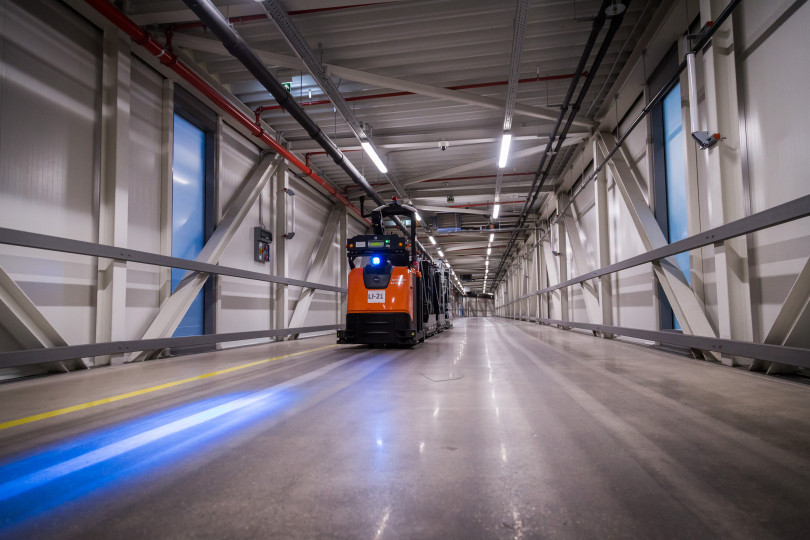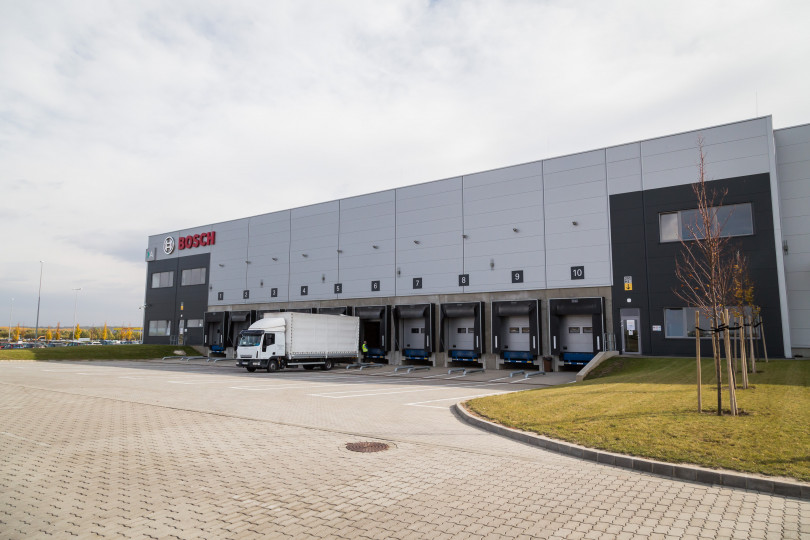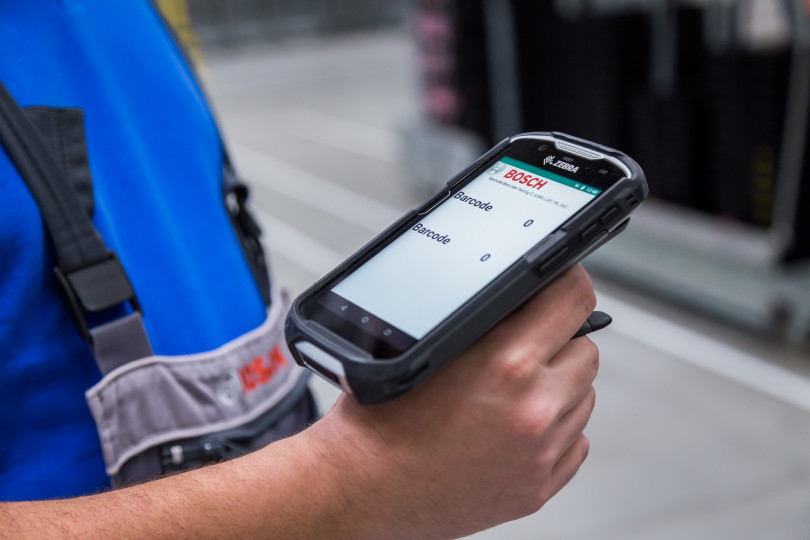Hatvan – Self-driving vehicles transport components, packaging, and ready products between Bosch’s two facilities in Hatvan. A digital, cloud-integrated system monitors the progress of products, automatic dock and yard management, special mobile printers and drones support the work of the associates – the warehouse of the future is already the reality at the Hatvan logistic center of Bosch. The Connected Hub featuring the most innovative logistics solutions recently launched fully automated vehicles and completed the implementation of the Industry 4.0 concept. “The 62,000-square-meter facility, which is the third largest warehouse center of Bosch in Europe, offers warehousing and returnable packaging services to the company’s plants in Hungary and in the region. The Connected Hub also acts as an intermediate warehouse base for Bosch’s Eastern European plants” – said Kerstin Barth, location manager of the Connected Hub.
The Connected Hub as the part of Bosch Hatvan plant is cooperating closely with the factory, which is the largest manufacturing center of Bosch’s automotive-electronics department in the world. It is a great opportunity, especially in developing processes and Industry 4.0 standards, and providing a unique opportunity to test and introduce innovative industrial-technological solutions.
“Bosch aims to digitize its entire supply chain and fully networked operation in its strategy of the Internet of Things (IoT). The Bosch Connected Hub in Hatvan is an outstanding, realized example of this vision with its unique Industry 4.0 and logistics solutions in the region” – emphasized István Szászi, representative of the Bosch Group in Hungary and the Adriatic region.
IoT, connectivity and Industry 4.0
The Industry 4.0 concept of Bosch set the realization of the so-called digital twin as an aim. This means creating a digital copy of the entire external supply chain at certain plants. The virtual twin keeps in constant contact with its physical partner via the IoT, making it a fully live simulation of real processes. In the Connected Hub this digital twin is based on Bosch's own cloud-based solution, so-called InTrack which is the system that monitors the logistics process from order and delivery of products to their arrival at the warehouse base. The processes can be easily tracked on a smartphone, tablet or computer using various applications. The solution does not only make transport more transparent, but also reduces the amount of physical work needed, and saves the environment as it makes paper documentation unnecessary. The system was developed by Bosch and Connected Hub was the first warehouse in the world, who has tested and implemented the whole systems and all elements.
Self-driving vehicles, and drones in the service of logistics
The majority of the innovative systems installed in the Connected Hub are improvements and developments of Bosch, such as the Dock&Yard and Cross Dock applications. The connected architecture of the warehouse base is also brand new: the warehouse is directly connected to the four halls of the neighboring plant via a bridge. The levels of the bridge at different heights are connected to the plant by a spiral path, through which the products are transported by the first fully automated vehicles used here.
The self-driving vehicles, the so-called milkruns, use laser navigation, measure distances and angles with sensors, and detect if someone or something is blocking their way. In such cases they stop immediately and start up again only after the obstacle has been removed. The milkrun fleet, consisting of 24 vehicles, is equipped with a comprehensive safety system, which, among other things, monitors the speed of the vehicles, thus reducing the possibility of accidents or defects. The vehicles travel nearly 800 km a day on their loops between the buildings. The milkrun fleet is unique in the world, considering the complexity of the activities carried out by it and the volume of traffic as well. Due to the intelligent software, the vehicles are in continuous connections with not only each other, but with other systems of the logistics center as well, such as the alarm system.
Internal transportation from and to the warehouse is equipped with RFID tags (radio frequency identification), which increases the traceability of the material flow. Scanners, mobile printers, and the RFID technology all support the effective logistic processes, while the inventory is made easier with the use of drones.
The third largest Bosch warehouse base in the world operates at Hatvan Bosch plant
The primary purpose of the logistics center is warehousing, and most of the stocks stored here can be related to the automotive industry, The Connected Hub is also responsible for supplying the company's plants in Hungary. The logistics center has an average stock of eleven-thousand different items and around two hundred trucks come to the base to deliver and to pick up products on a daily basis. A special washing facility is also deployed at the Connected Hub, which cleans 20-25.000 items of packages every day. The logistic services are 100% Bosch operated.
The facility located in the Inpark of Hatvan is rented by Bosch from the state-owned but market based national Nemzeti Ipari Park Üzemeltető és Fejlesztő Zrt. (NIPÜF). During the construction of Connected Hub, the company was given a great deal of freedom from the owner of the facility, and the logistics center was developed completely tailored to the needs of Bosch, with particular attention also to sustainability and energy efficiency aspects.
Sustainable warehouse base
The Hatvan warehouse is part of Bosch’s global supply chain network with around 780 warehouses. Across the globe, some 37,000 Bosch associates work in purchasing and logistics; they keep around 240 manufacturing plants supplied with parts and raw materials every day. Their core task is to ensure robust, sustainable and agile supply chains along the entire value stream to serve Bosch’s customers.
With centralizing several warehouses into one, Bosch could achieve a big contribution to the important aim of CO2 reduction by exactly 586 t p.a., because the centralized warehouse made lot of truck local and reginal transportation obsolete. Connected Hub is using lithium-ion based forklift fleet to have the opportunity of loading green energy and at the same time to avoid environmental impacts which come along with traditional batteries. Regarding the packaging method, Bosch Hatvan successfully reduced the returnable packaging stock by 30%, comparing to the decentralized warehousing setup. Industrial waste handling is an eco-friendly method as well, wood, plastic and cardboard are collected selectively.
Bosch is pressing ahead with its own climate action targets as planned and has reached a major milestone with the climate-neutral status of its more than 400 locations worldwide in spring 2020. As a result, Bosch is the first global industrial company whose own locations no longer leave a carbon footprint – this also includes the sites in Hungary. Bosch also aims to reduce CO2 emissions along its entire value chain, from suppliers to customers, by 15 percent by 2030 from their 2018 level – a reduction of 67 million metric tons of carbon dioxide emissions.
Zita Hella Varga
Phone: +36 70 667-6374
Bosch has been present in Hungary since 1898 with its products. After its re-establishment as a regional trading company in 1991, Bosch has grown into one of Hungary’s largest foreign industrial employers with currently nine subsidiaries. In fiscal 2020 it had total net sales of 1,497 billion forints and consolidated sales to third parties on the Hungarian market of 238 billion forints. The Bosch Group in Hungary employs more than 15,500 associates (as of December 31, 2020). In addition to its manufacturing, commercial and development business, Bosch has a network of sales and service operations that covers the entire country.
The Bosch Group is a leading global supplier of technology and services. It employs roughly 395,000 associates worldwide (as of December 31, 2020). The company generated sales of 71.5 billion euros in 2020. Its operations are divided into four business sectors: Mobility Solutions, Industrial Technology, Consumer Goods, and Energy and Building Technology. As a leading IoT provider, Bosch offers innovative solutions for smart homes, Industry 4.0, and connected mobility. Bosch is pursuing a vision of mobility that is sustainable, safe, and exciting. It uses its expertise in sensor technology, software, and services, as well as its own IoT cloud, to offer its customers connected, cross-domain solutions from a single source. The Bosch Group’s strategic objective is to facilitate connected living with products and solutions that either contain artificial intelligence (AI) or have been developed or manufactured with its help. Bosch improves quality of life worldwide with products and services that are innovative and spark enthusiasm. In short, Bosch creates technology that is “Invented for life.” The Bosch Group comprises Robert Bosch GmbH and its roughly 440 subsidiary and regional companies in some 60 countries. Including sales and service partners, Bosch’s global manufacturing, engineering, and sales network covers nearly every country in the world. With its more than 400 locations worldwide, the Bosch Group has been carbon neutral since the first quarter of 2020. The basis for the company’s future growth is its innovative strength. At 129 locations across the globe, Bosch employs some 73,000 associates in research and development, of which nearly 34,000 are software engineers.
The company was set up in Stuttgart in 1886 by Robert Bosch (1861-1942) as “Workshop for Precision Mechanics and Electrical Engineering.” The special ownership structure of Robert Bosch GmbH guarantees the entrepreneurial freedom of the Bosch Group, making it possible for the company to plan over the long term and to undertake significant upfront investments in the safeguarding of its future. Ninety-four percent of the share capital of Robert Bosch GmbH is held by Robert Bosch Stiftung GmbH, a charitable foundation. The remaining shares are held by Robert Bosch GmbH and by a corporation owned by the Bosch family. The majority of voting rights are held by Robert Bosch Industrietreuhand KG, an industrial trust. The entrepreneurial ownership functions are carried out by the trust.
Additional information is available online at www.bosch.hu, iot.boschblog.hu, www.bosch.com, www.iot.bosch.com, www.bosch-press.com, http://www.twitter.com/BoschPress.

